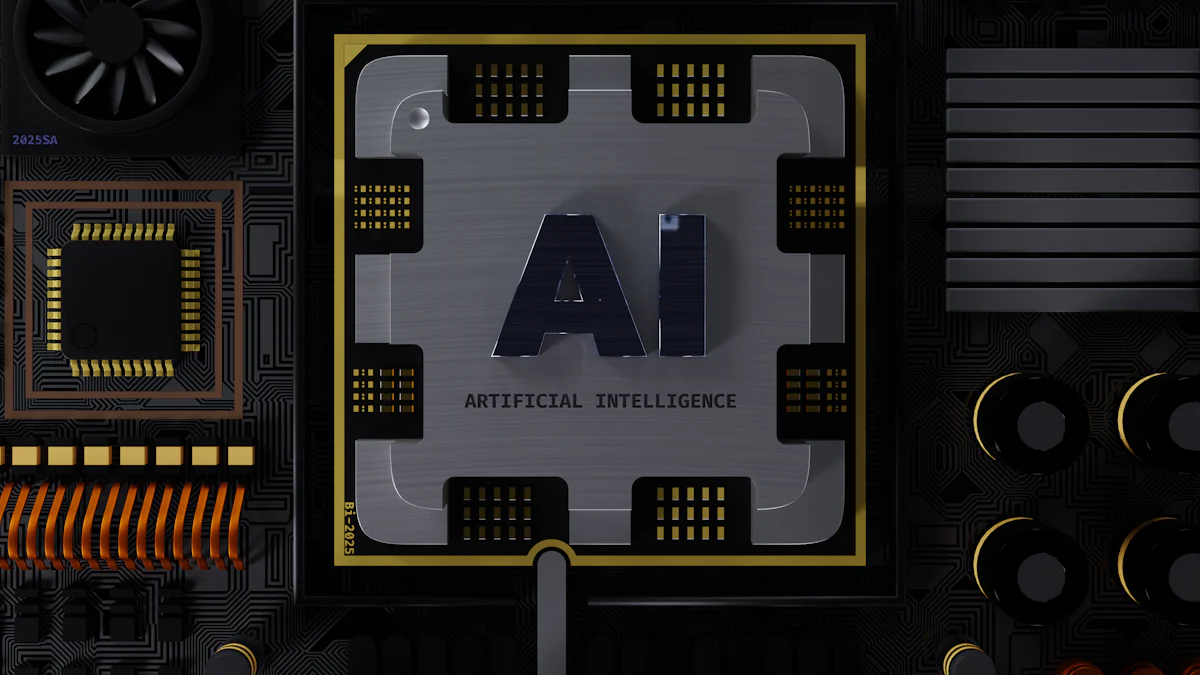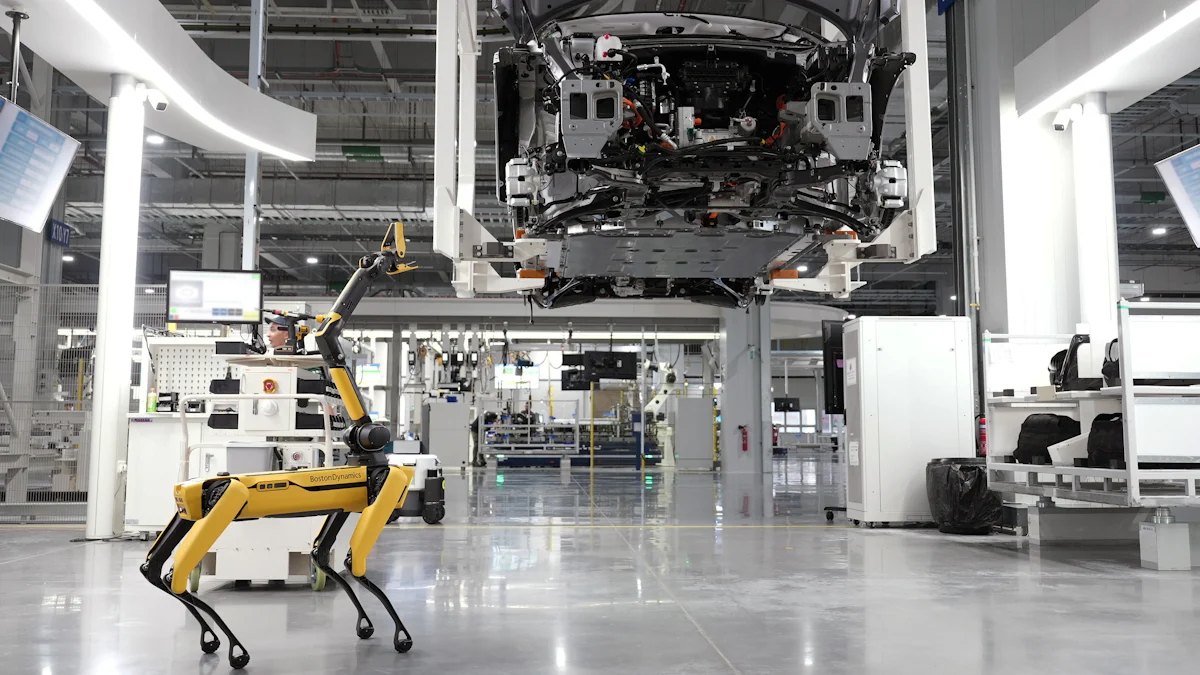2024 Automotive Market: Key Trends and Insights

The automotive market trends in 2024 hold significant importance due to their projected growth and transformative impact. Global automotive sales are expected to reach around 70 million units, reflecting a return to stability after years of turbulence. Understanding these key trends and insights becomes crucial for stakeholders to navigate this dynamic landscape effectively. The industry will witness advancements in electric vehicle adoption, autonomous driving technologies, and connectivity. These developments will shape the future of the automotive sector, making it essential for professionals to stay informed and adapt to changes.
Automotive Market Trends
Global Market Dynamics
Economic Factors
The automotive market trends in 2024 will be influenced by several economic factors. Global economic stability will play a crucial role in shaping consumer spending on vehicles. High interest rates will likely impact financing options, making car loans more expensive. Slow consumer spending will also affect the overall demand for new vehicles. The used car market will see a steady upward trend due to affordability concerns.
Regulatory Changes
Regulatory changes will significantly impact the automotive industry in 2024. Governments worldwide are implementing stricter emission standards to combat climate change. These regulations will push manufacturers to innovate and produce more eco-friendly vehicles. Incentives for electric vehicle (EV) adoption will vary across regions, affecting market dynamics. Europe and Asia will show different growth rates in EV sales due to varying government incentives and consumer preferences.
Regional Market Analysis
North America
North America's automotive market will experience a slight slowdown in 2024. US car sales are anticipated to grow by only 2.5%, a significant drop from the 14.6% growth seen in 2023. The shift towards online car sales will continue, with North America leading in online sales adoption. Economic factors such as high interest rates and slow consumer spending will influence market trends.
Europe
Europe's automotive market will focus heavily on electric vehicle adoption. Government incentives will drive EV sales, although the growth rate will vary across countries. Regulatory changes will enforce stricter emission standards, pushing manufacturers to produce more eco-friendly vehicles. The region will also face challenges related to supply chain disruptions and semiconductor shortages.
Asia-Pacific
The Asia-Pacific region will show diverse automotive market trends. Countries like China will lead in electric vehicle adoption due to strong government support and consumer interest. Other countries in the region will catch up rapidly in online car sales. Supply chain issues and shifts in labor dynamics will pose challenges. The region will also see a mix of growth rates in automotive sales, influenced by local economic conditions and regulatory changes.
Technological Advancements

Electric Vehicles (EVs)
Market Penetration
Electric vehicles (EVs) will see significant market penetration in 2024. The automotive market trends indicate a growing consumer preference for eco-friendly transportation. Governments worldwide are implementing incentives to boost EV adoption. These incentives include tax breaks, rebates, and subsidies. Manufacturers are responding by expanding their EV portfolios. Major automakers are investing heavily in research and development. This investment aims to improve battery technology and reduce costs. Enhanced battery performance will extend vehicle range and reduce charging times.
Charging Infrastructure
The expansion of charging infrastructure is crucial for EV adoption. Public and private sectors are collaborating to build more charging stations. Urban areas will see a higher concentration of these stations. Rural regions will also benefit from strategic placement. Fast-charging technology will become more prevalent. This technology reduces the time required to recharge an EV. Companies are developing wireless charging solutions. These solutions offer convenience and ease of use. The integration of renewable energy sources into charging networks will further enhance sustainability.
Autonomous Driving
Current Developments
Autonomous driving technology is advancing rapidly. Automotive market trends show increased investment in this area. Companies are focusing on developing sophisticated AI algorithms. These algorithms enhance the decision-making capabilities of autonomous vehicles. Advanced Driver Assistance Systems (ADAS) are becoming more common. ADAS includes features like lane-keeping assistance and adaptive cruise control. Cybersecurity measures are critical to protect these systems from hacking. Manufacturers are prioritizing the safety and reliability of autonomous vehicles.
Future Prospects
The future prospects for autonomous driving are promising. Experts predict widespread adoption within the next decade. The integration of machine learning models will improve vehicle performance. Autonomous vehicles will offer enhanced safety and efficiency. These vehicles will reduce traffic congestion and lower accident rates. The automotive industry will see a shift towards shared mobility services. Companies will offer autonomous ride-hailing and car-sharing options. Regulatory frameworks will evolve to support these advancements. Governments will implement policies to ensure safe and ethical use of autonomous technology.
Consumer Preferences
Shift Towards Sustainability
Eco-friendly Vehicles
Consumer preferences in the automotive market trends of 2024 show a significant shift towards eco-friendly vehicles. Increasing environmental awareness drives this demand. Stricter emission regulations also play a crucial role. A survey conducted by Cars Commerce revealed that nearly half of consumers plan to spend $30,000 on a new car. Many of these consumers prioritize sustainability. Electric vehicles (EVs) and hybrid models are gaining popularity. Manufacturers respond by expanding their eco-friendly vehicle portfolios. This trend aligns with global efforts to reduce carbon footprints.
Sustainable Manufacturing
Sustainable manufacturing practices are becoming essential in the automotive industry. Companies focus on reducing waste and minimizing environmental impact. The use of recycled materials in vehicle production is increasing. Energy-efficient manufacturing processes are also being adopted. These practices not only benefit the environment but also appeal to eco-conscious consumers. The automotive market trends indicate that sustainable manufacturing will continue to grow. This growth will drive innovation and set new industry standards.
Connectivity and Infotainment
In-car Technology
In-car technology is a major factor influencing consumer preferences. Modern vehicles offer advanced connectivity features. These features include integrated navigation systems and real-time traffic updates. Voice-activated controls and smartphone integration enhance the driving experience. Consumers seek vehicles with the latest technology. This demand pushes manufacturers to innovate continuously. The automotive market trends highlight the importance of staying ahead in technological advancements.
User Experience
User experience plays a critical role in shaping consumer preferences. Infotainment systems must be user-friendly and intuitive. High-quality audio and video systems enhance the overall driving experience. Consumers also value seamless connectivity with personal devices. Safety features integrated into infotainment systems are highly sought after. These features include emergency assistance and driver alerts. The focus on user experience will continue to influence automotive market trends. Manufacturers must prioritize both functionality and ease of use to meet consumer expectations.
Industry Challenges

Supply Chain Disruptions
Semiconductor Shortages
The automotive industry faces significant challenges due to semiconductor shortages. Manufacturers rely heavily on semiconductors for vehicle production. These components are crucial for advanced driver assistance systems (ADAS), infotainment, and engine control units. The shortage has led to production delays and increased costs. Many manufacturers have had to halt production lines temporarily. This disruption affects the availability of new vehicles in the market. Companies must seek alternative suppliers and invest in long-term solutions.
Logistics Issues
Logistics issues also pose a major challenge for the automotive industry. Global supply chains are complex and involve multiple stakeholders. Delays in shipping and transportation affect the timely delivery of parts and components. Port congestion and labor shortages exacerbate these problems. Efficient logistics management becomes critical to minimize disruptions. Companies must adopt advanced technologies to enhance visibility and coordination. Real-time tracking and predictive analytics can help mitigate risks and improve efficiency.
Competitive Landscape
Major Players
Major players in the automotive industry continue to dominate the market. Companies like Toyota, Volkswagen, and General Motors lead in terms of production and sales. These giants invest heavily in research and development. Innovations in electric vehicles (EVs) and autonomous driving technologies are their primary focus. These companies also benefit from established brand recognition and extensive distribution networks. However, they face pressure to adapt to changing consumer preferences and regulatory requirements.
Emerging Startups
Emerging startups are disrupting the traditional automotive landscape. Companies like Rivian, Lucid Motors, and NIO are gaining traction with innovative products. These startups focus on electric vehicles and sustainable mobility solutions. They attract significant investment and attention from consumers. Agile business models allow them to respond quickly to market demands. However, they face challenges related to scaling production and establishing brand loyalty. Collaboration with established players can offer strategic advantages.
Case Study: JusLink Smart Supply Chain Platform Implementation
A major automotive manufacturer faced severe supply chain disruptions. The implementation of the JusLink Smart Supply Chain Platform provided a solution. This platform enabled real-time collaboration and improved resource utilization. The outcome included a 20% reduction in lead times, improved efficiency, and cost savings. This case study highlights the importance of technological integration in overcoming supply chain challenges.
JUSDA's Role in the Automotive Supply Chain
Comprehensive End-to-End Solutions
Raw Material Procurement
JUSDA excels in raw material procurement by leveraging advanced technologies and a global network. The company ensures seamless integration of materials from suppliers to manufacturers. This approach minimizes delays and enhances efficiency. JUSDA's expertise in sourcing high-quality materials supports the production of reliable automotive components. The company's strategic partnerships with suppliers guarantee a steady supply of essential materials. This reliability is crucial for maintaining production schedules and meeting market demands.
Manufacturing and Distribution
JUSDA provides comprehensive manufacturing and distribution solutions tailored to the automotive industry. The company's K2L (Kitting to Line) services optimize the assembly process. This service ensures that materials are delivered precisely when needed on the production line. JUSDA's innovative approach reduces waste and improves productivity. The company's extensive warehousing capabilities support efficient storage and distribution. Over 2.5 million square meters of warehousing space enable JUSDA to manage large volumes of automotive components. JUSDA's global presence, with service points in over 15 countries, ensures timely delivery to various markets.
Technological Integration
Big Data and IoT
JUSDA harnesses the power of Big Data and IoT to revolutionize supply chain management. The JusLink Smart Supply Chain platform provides real-time tracking and predictive maintenance. This platform enhances transparency and enables proactive management of potential disruptions. Suppliers, manufacturers, and distributors benefit from improved coordination. JUSDA's use of IoT devices ensures accurate monitoring of inventory levels and shipment conditions. This technology-driven approach reduces the risk of delays and enhances overall efficiency.
Cloud Platforms
JUSDA utilizes cloud platforms to streamline supply chain operations. The JusLink platform offers seamless connectivity and information sharing across the entire supply chain ecosystem. Cloud computing enables real-time data access and collaboration among stakeholders. This integration supports agile decision-making and rapid response to market changes. JUSDA's commitment to digital transformation drives continuous improvement in supply chain processes. The company's innovative solutions set new standards for efficiency and sustainability in the automotive industry.
JUSDA stands at the forefront of supply chain innovation, offering tailored solutions that enhance productivity and cost-effectiveness. The company's focus on end-to-end integration, from raw materials to finished products, ensures a flawless fusion of material supply with production workflows. By embracing Industry 4.0, JUSDA continues to push boundaries with multimodal transport networks and advanced warehouse management systems.

JUSDA Solutions
To provide you with professional solutions and quotations.
The 2024 automotive market will experience significant transformations driven by technological advancements, regulatory changes, and shifting consumer preferences. Electric vehicles (EVs) and autonomous driving technologies will reshape the industry. Sustainability and environmental awareness will play a crucial role in manufacturing and consumer choices.
The future of the automotive market will focus on accessible mobility and innovative technologies. Industry stakeholders must stay informed and adapt to these changes. Embracing advanced technologies like IoT, AI, and blockchain will optimize efficiency and sustainability in automotive supply chains.
See Also
Maximizing Your Automotive Supply Chain's Potential
Enhancing Automotive Demand Forecasting with Data-driven Decisions
Revealing How Technology Shapes Market Trends
5 Key Trends Driving Future Supply Chain Efficiency
Expert Strategies for Overcoming Automotive Supply Chain Challenges
